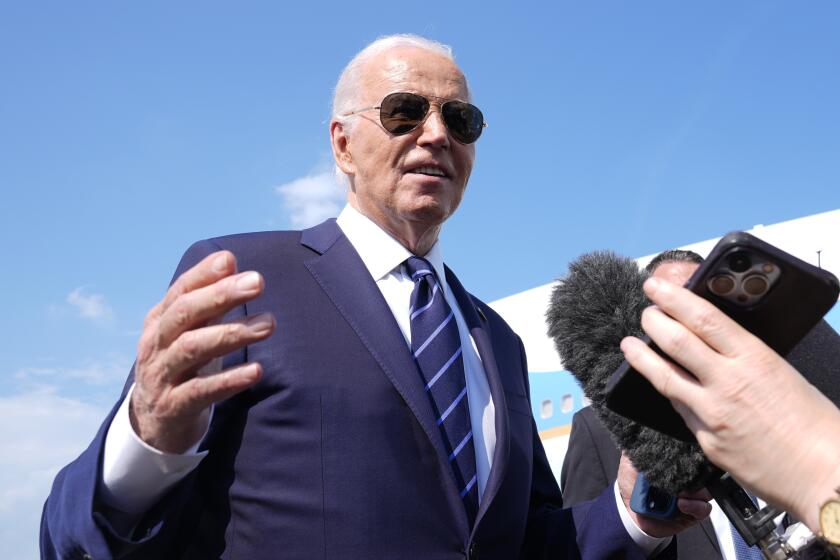CIA bomber was a Jordanian double agent, ex-spy official says
The suicide bomber who killed eight people at a CIA compound in Afghanistan was a Jordanian recruited by that nation’s spy service who lured operatives to a meeting with a promise of important new information about Al Qaeda’s inner circle, according to a former senior U.S. intelligence official.
The bombing last week killed seven CIA employees and a Jordanian intelligence officer who is believed to have served as the main point of contact with the informant.
The disclosure that the deadliest incident in recent CIA history may have been the work of a double agent suggests a new level of sophistication in Al Qaeda’s efforts to retaliate against the agency, which is responsible for an intense campaign of Predator drone strikes on the terrorist network in Pakistan over the last two years. It also underscored the risks inherent in the CIA’s reliance on Jordan and other foreign partners in sensitive counter-terrorism operations.
“That’s how you do these operations -- you find people who can conceivably penetrate terrorist organizations, try to turn them and run them,” said the former U.S. intelligence official, who is familiar with aspects of last week’s attack but spoke on condition of anonymity. “Obviously, this one turned out tragically.”
Another former senior U.S. intelligence official who served in the region said that high-level CIA operatives from Kabul had been summoned to the remote base near Khowst for what they were led to believe would be an important meeting with a well-placed informant.
At least two of those CIA officers from Kabul were wounded, the former agency official said. The former official said that the fact that the informant was able to enter the base with a bomb strapped to his body suggests that he had earned the trust of his CIA and Jordanian handlers.
“What this tells you is that Al Qaeda is now capable of running a fairly sophisticated double-agent operation,” the former CIA official said. “This guy totally had them believing, which means he had [previously] given them verifiable information and everything had checked out.”
Still, former officials said the suicide bombing represented a serious and so far unexplained breach of security at the heavily guarded base in eastern Afghanistan near the Pakistani border, where operatives focus on gathering information about Al Qaeda, the Taliban and militant groups allied with them. Both Afghan and Pakistani fighters find refuge in Pakistan’s tribal areas.
A CIA spokesman declined to comment on the circumstances of the attack or the agency’s relationship with Jordan’s intelligence service. Sources who provided information about the attack said that many details remained unclear.
The bomber was identified as Humam Khalil Abu-Mulal Balawi, a 36-year-old doctor from Zarqa, Jordan, which was also the hometown of Abu Musab Zarqawi, Al Qaeda’s top operative in Iraq before he was killed in 2006. Balawi’s identity was first reported by Al Jazeera, which said he was arrested by Jordan’s intelligence service more than a year ago.
The service, known as the General Intelligence Department, or GID, believed it had succeeded in turning Balawi from an Al Qaeda sympathizer into an asset who could be used to penetrate the network.
Balawi’s assignment was to help track down Al Qaeda’s No. 2, Egyptian physician Ayman Zawahiri, according to the Al Jazeera report, which said that the bomber had fooled his Jordanian and CIA contacts for more than a year.
Hours after Wednesday’s attack, the Taliban said it was responsible and claimed that the bombing was carried out by an Afghan soldier, which the Afghan military staunchly denied.
Evan Kohlmann, a counter-terrorism expert, said that Balawi was a “notorious Al Qaeda cyber-activist” known for extremist postings. Kohlmann said in an e-mail that Balawi’s online moniker was Abu Dujanah al-Khorasani and that “he had announced he was leaving to go join the fight in Afghanistan, and was trying to inspire others to follow in his footsteps.”
The Jordanian intelligence officer killed in the attack was identified as Sharif Ali bin Zeid. Jordan’s King Abdullah II was present when Ali’s casket arrived in the country, according to a report by Jordan’s news service, which said only that Ali “fell as he performed his humanitarian duty with the Jordanian contingent” in Afghanistan.
U.S. officials said that the bombing was unlikely to have an effect on the CIA’s work with its Jordanian counterpart.
The agency’s relationship with the GID is “probably the most solid one we have” in the Arab world, said a former high-ranking U.S. intelligence official who spoke on condition of anonymity because of the sensitivity of the subject.
The relationship dates to the 1950s, officials said, and expanded in the aftermath of the Sept. 11 attacks. Human rights groups have accused Jordan of involvement in CIA interrogation and rendition operations.
The CIA collaborated extensively with Jordan, as well as other Arab allies, on a program launched after the Sept. 11 strikes to identify recruits in the Muslim world who could be used to gather intelligence on Al Qaeda.
One former high-ranking U.S. intelligence official said the effort was dubbed the “baby terrorist program,” because its aim was to identify individuals who could pass as Islamic militants and be turned against them.
“The theory behind it was that right after the attacks we were looking to recruit sources who could penetrate terrorist organizations,” the former official said. “We worked with friendly services, and certainly the Jordanians.”
The disclosure of Jordan’s ties to the attack came as CIA Director Leon E. Panetta and other agency officials traveled to Dover Air Force Base in Delaware for the arrival of the bodies of the seven slain agency employees, said George Little, a CIA spokesman.
Among those killed were four CIA officers and three contractors hired to provide security.
Times staff writer Sebastian Rotella contributed to this report.
More to Read
Start your day right
Sign up for Essential California for news, features and recommendations from the L.A. Times and beyond in your inbox six days a week.
You may occasionally receive promotional content from the Los Angeles Times.






